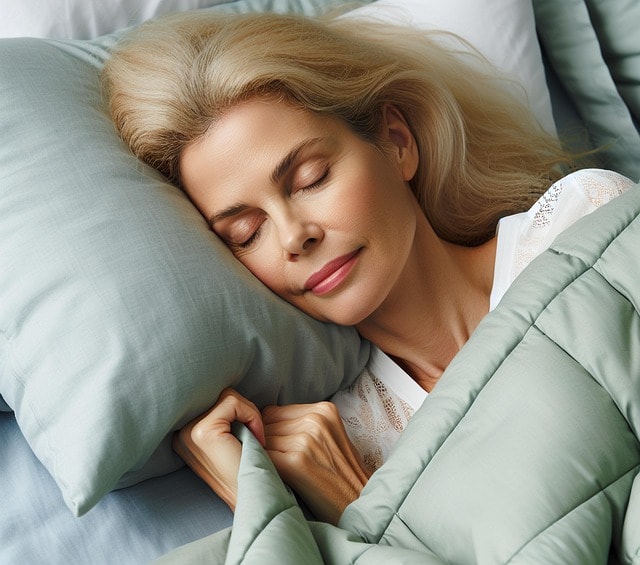Self Care Tips for Over 50s Women: Your Complete Wellness Guide
Key Takeaways Prioritise regular health screenings including mammograms, and bone…
Key Takeaways
- Prioritise regular health screenings including mammograms, and bone density tests starting at age 50
- Focus on calcium (1,200 mg daily), vitamin D, and protein intake to combat bone density loss during menopause
- Maintain 7-9 hours of quality sleep and establish consistent sleep routines to support hormonal balance
- Incorporate stress management techniques like meditation, yoga, or journaling to improve overall well-being
- Stay physically active with a combination of strength training, cardio, and flexibility exercises to preserve muscle mass
Turning 50 marks a pivotal moment in many women’s lives, bringing both opportunities for growth and unique health challenges. The menopausal transition, combined with life stressors like raising children leaving home or caring for aging parents, creates a perfect storm that demands intentional self care strategies.
Research shows that women who prioritise comprehensive self care during their 50s and beyond experience better physical health, improved mental well-being, and enhanced quality of life. This isn’t about superficial wellness trends—it’s about evidence-based practices that address the specific health needs of postmenopausal women.
The years after 50 present increased risk factors for heart disease, osteoporosis, and chronic diseases, making proactive self care more crucial than ever. However, with the right approach to nutrition, exercise, stress management, and preventive healthcare, many women find this life stage to be their most empowering and fulfilling yet. Taking control of your health and well-being through proactive self care choices can make a significant difference in how you experience this transition.
Engaging in self reflection can help you identify personal health goals and concerns, allowing you to plan more effectively for this important stage of life.
Building Your Physical Health Foundation
Physical activity becomes increasingly vital as women age, particularly for maintaining bone health and preventing the muscle loss that accelerates after menopause. Regular movement is essential for supporting overall health and well-being as women progress through different ages.
The foundation of physical health after 50 rests on three pillars: cardiovascular exercise, strength training, and flexibility work. The American Heart Association recommends at least 150 minutes of moderate-intensity aerobic activity weekly, plus two sessions of strength training to support bone health and preserve muscle mass.
Weight-bearing exercises prove especially beneficial for postmenopausal women, as declining oestrogen levels accelerate bone density loss. Activities like walking, dancing, or tennis help stimulate bone formation, while resistance training with weights or resistance bands directly combats muscle decline as our bodies change with age, making it important to adapt exercise routines accordingly.
Balance training deserves special attention, as fall risk increases with age. As women reach older ages, balance training becomes even more important. Simple exercises like standing on one leg or practicing tai chi can significantly improve stability and confidence in daily activities.

Starting a Safe Exercise Routine
Beginning a new exercise program requires careful consideration of existing health conditions and fitness level. Before starting any new routine, women over 50 should consult their healthcare providers, especially if they have risk factors like high blood pressure or heart disease.
Low-impact activities offer excellent starting points for beginners or those with joint concerns. Swimming provides a full-body workout without stressing joints, while tai chi combines gentle movement with balance training and stress reduction. Walking remains one of the most accessible forms of exercise, requiring no special equipment while delivering substantial health benefits.
The key to sustainable exercise lies in gradual progression. Starting with 10-15 minute sessions and slowly increasing duration and intensity prevents injury and builds lasting healthy habits. Listen to your body—some muscle soreness is normal, but sharp pain signals the need to modify or rest.
For women managing arthritis or other joint conditions, water-based exercises or chair-based movements can provide valuable physical activity without exacerbating symptoms. The goal is consistent movement rather than perfect performance.
Nutrition and Hydration for Optimal Health
Nutritional needs shift significantly after menopause, making dietary awareness crucial for maintaining good health. Making dietary changes, such as adopting a balanced eating pattern, is important to support health after menopause. The metabolic changes that accompany hormonal shifts mean many women experience weight gain despite eating the same foods they always have.
Calcium requirements increase to 1,200 mg daily for women over 50, as decreased oestrogen accelerates bone loss. While dairy products remain excellent sources, women can also obtain calcium daily from fortified plant-based milks, leafy greens, sardines, and almonds. Pairing calcium-rich foods with vitamin D sources enhances absorption and supports bone health.
Protein intake becomes increasingly important for preserving muscle mass, with recommendations ranging from 1.2 to 1.6 grams per kilogram of body weight. This translates to roughly 85-110 grams daily for a 150-pound woman—significantly higher than many women typically consume. Eating healthily, with a focus on adequate protein and nutrient-rich foods, can help manage weight and support overall well-being.
The Mediterranean diet offers particular benefits for women’s health after 50, supporting both heart health and cognitive function. This eating pattern emphasizes whole grains, lean proteins, healthy fats from sources like olive oil and nuts, and abundant fruits and vegetables rich in antioxidants.
Adequate hydration often becomes more challenging with age, as thirst sensation diminishes. Aiming for 8-10 glasses of water daily helps maintain energy levels, supports kidney function, and may help manage menopausal symptoms like hot flashes.
Foods That Support Healthy Aging
Certain foods provide exceptional benefits for women navigating the aging process. Incorporating foods rich in antioxidants, healthy fats, and essential nutrients can help slow the ageing process and promote longevity. Fatty fish like salmon, mackerel, and sardines supply omega-3 fatty acids that support both heart health and brain function while providing vitamin D for bone health.
Brain-boosting foods deserve special attention as cognitive health becomes a priority. Blueberries, walnuts, and leafy greens contain compounds that may help protect against age-related cognitive decline. Regular consumption of these foods, combined with staying mentally active, supports long-term brain health. Nutrients like calcium and vitamin D are crucial for maintaining strong bones, especially during and after menopause. Foods such as dairy products, leafy greens, prunes, and fish help support bone health and reduce the risk of osteoporosis.
Whole grains provide sustained energy and fibre for digestive health, while also helping to manage cholesterol levels. Quinoa, brown rice, and oats offer more nutrients than refined grains and help maintain stable blood sugar levels.
Foods to limit include processed options high in sodium, which can contribute to high blood pressure—a particular concern for postmenopausal women. Keeping sodium intake under 1,500 mg daily supports cardiovascular health and may help manage bloating and water retention.

Managing Hormonal Changes and Menopause
The menopausal transition typically begins 7-14 years before actual menopause, during a phase called perimenopause. Understanding this timeline helps women prepare for and manage the gradual hormonal changes that affect everything from sleep patterns to emotional well-being.
Bone density scans are often recommended during menopause to assess osteoporosis risk. Research shows that white women are at higher risk for osteoporosis compared to other groups, making regular screening especially important for this population.
Hot flashes affect up to 75% of women during the menopausal transition, often disrupting sleep and daily activities. Natural management strategies include dressing in layers, keeping environments cool, avoiding triggers like spicy foods or alcohol, and practicing stress reduction techniques.
Sleep disturbances during menopause extend beyond hot flashes to include difficulty falling asleep and frequent waking. Night sweats can disrupt the seven to nine hours of quality sleep that remain essential for optimal health and recovery.
Vaginal dryness, another common symptom, can affect comfort and intimacy. Over-the-counter moisturizers and lubricants provide relief for many women, while prescription treatments offer additional options for persistent symptoms.
Mood changes during menopause deserve attention and professional support when needed. The hormonal fluctuations can trigger anxiety, depression, or irritability that significantly impacts quality of life. Recognizing these changes as hormone-related rather than personal failings helps women seek appropriate support.
For some women, hormone replacement therapy provides significant symptom relief, though it requires careful consideration of individual risk factors with healthcare providers. Alternative approaches like acupuncture, herbal supplements, or meditation offer additional options for symptom management.
Mental and Emotional Wellness
Mental health becomes increasingly important during midlife transitions, as women navigate changing roles and relationships alongside physical changes. The empty nest phase, caring for aging parents, and potential career transitions create multiple sources of stress that require active management.
Stress management techniques become essential tools for maintaining emotional balance. Daily meditation, even for just 10-15 minutes, can significantly reduce cortisol levels and improve overall well-being. Deep breathing exercises offer quick stress relief that can be used anywhere, while journaling provides an outlet for processing complex emotions.
Building emotional resilience involves developing healthy coping strategies and maintaining perspective during challenging times. This might include practicing gratitude, setting realistic expectations, and celebrating small victories rather than focusing solely on major achievements.
Cognitive health maintenance becomes a priority as women age, with research suggesting that staying mentally active may help preserve cognitive function. Learning new skills, reading regularly, solving puzzles, or taking classes all contribute to maintaining mental sharpness.
The importance of maintaining purpose cannot be overstated during this life stage. Many women find fulfilment in pursuing interests that were set aside during busier parenting or career-building years. Whether through volunteer work, creative pursuits, or new career directions, having a sense of purpose contributes significantly to mental health.
Developing Healthy Coping Strategies
Creating daily mindfulness routines provides structure and stress relief during turbulent times. A morning meditation session, even as brief as 10 minutes, can set a positive tone for the entire day and improve emotional regulation.
Stress-reduction activities should be both enjoyable and accessible. Yoga classes offer physical benefits alongside mental calm, while nature walks provide fresh air, gentle exercise, and mood-boosting exposure to sunlight. Creative hobbies like painting, gardening, or music provide outlets for self-expression and stress relief.
Professional support options deserve consideration when stress becomes overwhelming or persistent. Therapy, support groups, or life coaching can provide valuable tools and perspectives for navigating midlife challenges. There’s no shame in seeking help—it’s a sign of wisdom and self-care.
Building emotional intelligence and communication skills supports better relationships during a time when many relationships are changing. This might involve learning to set boundaries, expressing needs clearly, or developing empathy for others also navigating life transitions.

Essential Preventive Healthcare
Preventive healthcare becomes increasingly crucial after 50, as early detection of health issues significantly improves treatment outcomes. Preventive care is essential to stay healthy as women age, helping to maintain well-being and quality of life. Annual check ups provide opportunities to monitor changing health needs and adjust care accordingly.
Mammograms should begin annually at age 50 for most women, though those with family history or other risk factors may need earlier screening. Breast cancer risk increases with age, making regular screening a critical component of women’s health maintenance.
Bone density scans (DEXA scans) should occur every two years after menopause to monitor for osteoporosis. Given that this condition affects one in two women over 50, regular monitoring allows for early intervention to support bone health.
Cardiovascular screening becomes increasingly important as heart disease risk rises after menopause. Annual blood pressure checks, cholesterol monitoring, and diabetes screening help identify and manage risk factors before they progress to serious disease.
Recommended vaccinations include the shingles vaccine at age 50, annual flu shots, and pneumonia vaccines as advised by healthcare providers. These preventive measures become more important as immune function naturally declines with age.
Working with Healthcare Providers
Preparing for medical appointments maximizes their value and ensures important issues aren’t overlooked. Keep a running list of symptoms, questions, and concerns to discuss. Bring current medication lists and be prepared to discuss family history and lifestyle factors.
Finding the right specialists may become necessary as health needs evolve. Gynaecologists specializing in menopause, cardiologists for heart health concerns, and endocrinologists for hormonal issues can provide specialized care when needed.
Advocating for your health needs involves being persistent when something doesn’t feel right and seeking second opinions for major decisions. Trust your instincts—you know your whole body better than anyone else.
Optimizing Sleep and Recovery
Sleep challenges often intensify during menopause, with many women experiencing their first significant sleep disturbances during this time. Night sweats, anxiety, and hormonal fluctuations can all contribute to insomnia and frequent waking.
Creating an ideal sleep environment becomes crucial for maintaining the seven to nine hours of quality sleep that remain essential for health. Optimizing sleep can help women over 50 experience more energy throughout the day. Keep bedrooms cool (around 65-68°F), invest in moisture-wicking bedding for night sweats, and use blackout curtains to minimize light disruption.
Establishing consistent bedtime routines signals the body to prepare for sleep. This might include turning off screens at least one hour before bed, practicing gentle stretching or reading, and avoiding caffeine after 2 PM.
Natural sleep aids can provide gentle support without the dependence risks of prescription medications. Chamomile tea has mild sedative properties, while magnesium supplements may help with muscle relaxation and sleep quality. Lavender aromatherapy, whether through pillow sprays or diffusers, can promote relaxation.
When sleep problems persist despite good sleep hygiene, consulting sleep specialists may be necessary. Sleep apnoea becomes more common with age and can significantly impact both sleep quality and overall health if left untreated.

Building Strong Social Connections
Social isolation becomes a significant health risk for many women over 50, particularly as life transitions disrupt established social networks. The empty nest syndrome, retirement, or loss of friends and family members can lead to loneliness that impacts both mental and physical health.
Maintaining existing friendships requires intentional effort as busy lives often interfere with regular contact. Schedule regular phone calls, plan monthly lunches, or organize group activities that bring friends together consistently.
Joining community groups provides opportunities to meet like-minded individuals while pursuing interests. Book clubs, fitness classes, volunteer organizations, or hobby groups offer structured social interaction alongside meaningful activities.
Intergenerational relationships offer unique benefits, whether through mentoring younger women, spending time with grandchildren, or teaching skills to others. These connections provide purpose while offering fresh perspectives on life.
Social connectedness directly impacts physical health, with studies showing that strong social ties can reduce risk of chronic diseases and improve immune function. Prioritizing relationships isn’t just nice—it’s essential for optimal health.







